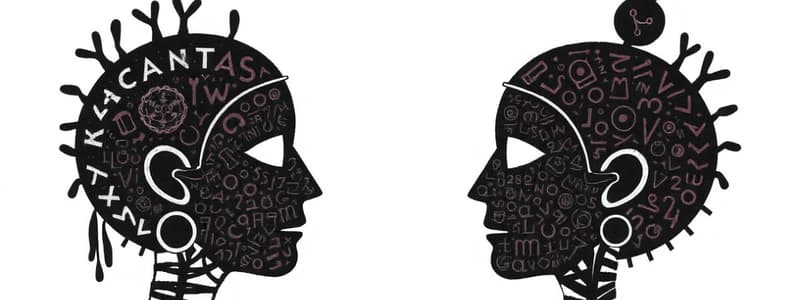Podcast
Questions and Answers
Which of the following is NOT a branch of anthropology?
Which of the following is NOT a branch of anthropology?
- Archaeological Anthropology
- Biological Anthropology
- Social Psychology (correct)
- Cultural Anthropology
The primary focus of sociology is individual behavior.
The primary focus of sociology is individual behavior.
False (B)
What is the main difference between primary and secondary research?
What is the main difference between primary and secondary research?
Primary research involves collecting original data, while secondary research involves analyzing existing data.
Ethical experiments are designed to ensure no ________________ and/or ____________________ harm is done.
Ethical experiments are designed to ensure no ________________ and/or ____________________ harm is done.
Match the following concepts to their definitions:
Match the following concepts to their definitions:
What type of correlation is indicated by a correlation coefficient of -0.8?
What type of correlation is indicated by a correlation coefficient of -0.8?
Confounding variables can enhance the accuracy of an experiment.
Confounding variables can enhance the accuracy of an experiment.
What is the significance of the Belmont Report in social research?
What is the significance of the Belmont Report in social research?
A strong correlation coefficient is closer to ________________ or ________________.
A strong correlation coefficient is closer to ________________ or ________________.
Which of the following is a method of data collection?
Which of the following is a method of data collection?
Flashcards are hidden until you start studying
Study Notes
Introduction to Social Science
- Anthropology studies human behavior, culture, and societies through various branches: cultural anthropology, physical anthropology, archaeology, and linguistic anthropology.
- Sociology focuses on social behavior, institutions, and structures, analyzing how individuals interact within societies and the impact of social norms.
- Psychology examines mental processes and human behavior with predominant schools of thought: behaviorism, cognitive psychology, humanistic psychology, and psychoanalysis.
Research Interests in Social Sciences
- Anthropologists investigate cultural practices, rituals, and social structures among different communities.
- Sociologists pose questions about social relationships, group dynamics, and how social changes affect individuals and society.
- Psychologists seek to understand thoughts, emotions, and behaviors, often exploring topics like mental health, motivation, and perception.
The Social Science Inquiry Method
- Steps include formulating a question, developing a hypothesis, conducting research, analyzing data, and drawing conclusions.
- A good hypothesis is testable, providing a clear prediction of outcomes based on theoretical foundations.
- Operational definitions specify how variables are measured or identified in a study.
Sampling Techniques and Data Collection
- Two sampling techniques discussed are random sampling and stratified sampling.
- Data collection methods include surveys, interviews, observations, and experiments.
- Primary research involves collecting new data directly from sources, whereas secondary research involves analyzing existing data.
Pros and Cons of Data Collection
- Primary research offers specific, tailored data but can be time-consuming and expensive.
- Secondary research is quicker and less costly but may not address specific research questions directly.
- Different types of observation include participant observation, non-participant observation, and systematic observation, each with unique approaches.
Correlational vs. Experimental Studies
- Correlational studies identify relationships between variables without manipulation, while experimental studies involve controlled experimentation to determine causal effects.
- Positive correlations indicate that as one variable increases, the other does as well; negative correlations show an inverse relationship.
- Strong correlation coefficients rise closer to 1 or -1; weak coefficients are closer to 0.
- The directionality problem raises questions about causation direction; third variables are extraneous factors influencing variables in correlation.
Experimental Study Components
- Key components include independent variables (manipulated by researchers) and dependent variables (measured outcomes).
- Control groups do not receive experimental treatment, whereas experimental groups do.
- A placebo is a non-active treatment to control for participant expectations.
- Confounding variables are external factors that could influence the results, complicating interpretation.
Reliability vs. Validity
- Reliability types include test-retest reliability, inter-rater reliability, and internal consistency.
- Validity types consist of construct validity, content validity, and criterion-related validity.
Ethical Guidelines
- Ethical experiments ensure no physical or psychological harm is done to participants.
- The Belmont Report establishes ethical principles in research: respect for persons, beneficence, and justice, crucial for protecting participants and promoting responsible research practices.
Studying That Suits You
Use AI to generate personalized quizzes and flashcards to suit your learning preferences.




